January 1820: George Comes, George Goes; Hope despite T Wang-Dillo-Dee
; Urn
Published
Wentworth Place, Hampstead
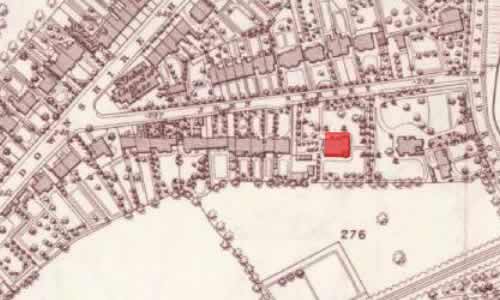
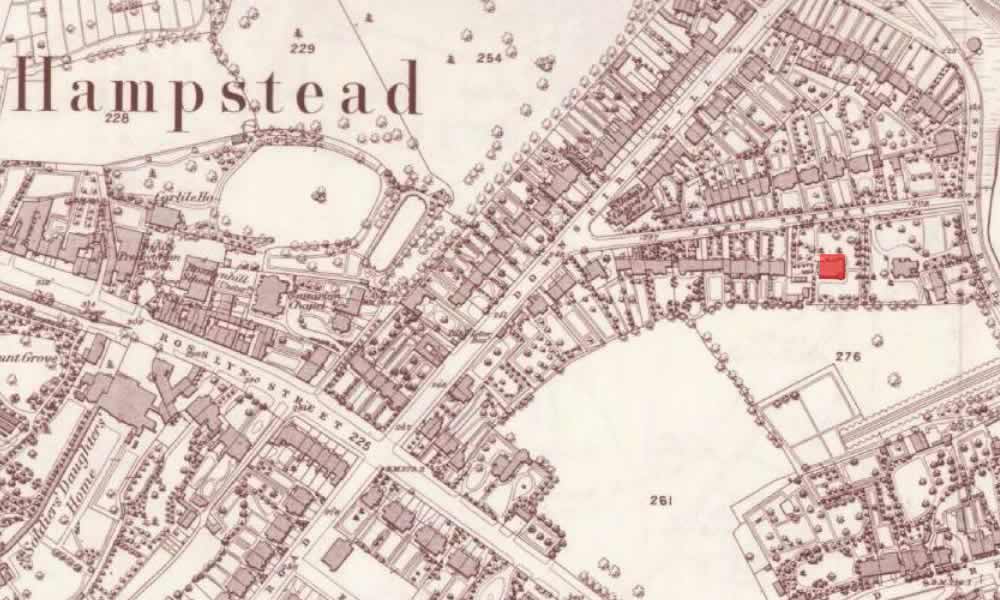
Keats’s younger brother, George, arrives from America early in the month; he leaves 1 February. George’s mission is to clear up and make his claims for his share of family funds, which in part is now tied to the death of their younger brother, Tom, and the resulting redistribution. George aims to re-finance himself, having lost most of his money in a dubious business venture in America.
In December, Keats, aged twenty-four, works hard to help George by meeting with the usually truculent trustee of the family money and family
guardian, Richard Abbey. When George’s deal is
worked out, George reports that Abbey behaved very kindly to me
(30 Jan). Keats feels
very differently: Abbey, he believes, has been stingy in even allowing Keats open
access to
meeting with the youngest of the Keats siblings, Fanny—and also denied her pocket
money. Keats
also notes that Abbey, By detaining money from me and George when we most wanted it he has
increased our expenses.
Keats’s conclusion: Abbey has not behaved well
(letters,
14 Feb). The general feeling (with Keats himself and a few of his friends) is that
George
somewhat aggressively assumes more than his fair share of the estate, though this
may not have
been the case. (One of Keats’s closest friends, Charles
Brown, believed George swindled Keats out of money.) To the end of his life, Keats
never trusts Abbey. Keats is never aware that a significant inherited sum (perhaps
around 800
pounds, via his maternal grandfather) is waiting for him through the court, where
it has been
accumulating interest. It appears Abbey himself might likewise not have known about
these
other funds.
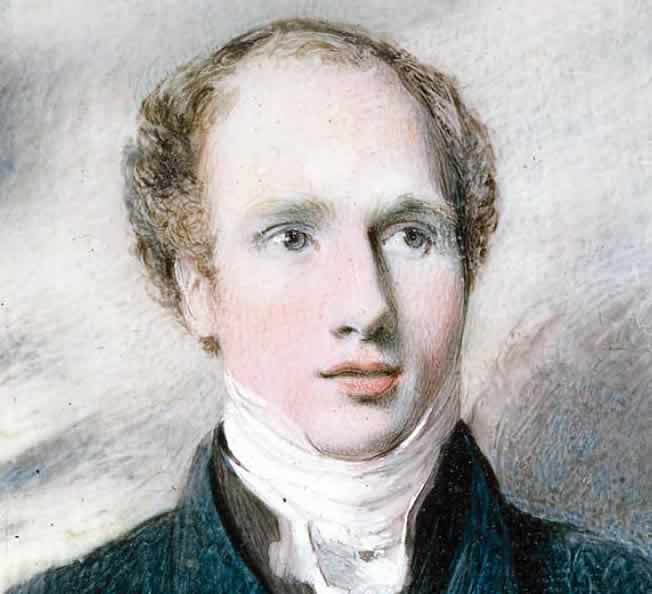
Besides dealing with Abbey during January, George and Keats socializes quite a bit with mutual friends—dancing, dining, and partying. George makes some copies of Keats’s poetry, including Ode to a Nightingale (at this point it seems to be called The Nightingale).
Despite the wealth of social activity—or perhaps because of it—Keats feels idle and
unsettled. In writing to George’s wife in America
over 13-28 January, he expresses, somewhat playfully, that, Upon the whole I dislike
Mankind,
and, in particular, self-interested types. He also notes the boring
predictability in socializing with certain friends, as well as a vague dullness
and
disenchantment with life, and London life in particular. Keats’s conclusion: like
people for
their good parts
and ignore the dull process of their every day Lives
(letters, 15 Jan). He has thoughts of retiring to the country, where he can avoid
news.
Somewhat whimsically, he also wishes he had money enough to do nothing but travel about for
years.
He nonetheless takes time to have some fun in his long journal letter, including
a brilliantly humorous typology of three of his witty
friends, as well as having some
fun at those who have no wit at all, each distinct in his excellence.
T wang-dillo-dee,
Keats writes eight times to encapsulate random examples and sites of
nonsense he observes, including modern poems, some lords, London, and Earth itself
(letters,
17 Jan). This is, in fact, pretty funny.
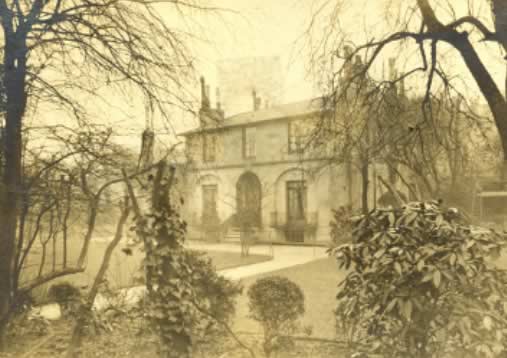
In January, Keats, aged twenty-four, still maintains hopes for making some money from
a play,
Otho the Great, co-written with his generous and very close
friend Charles Brown, his roommate at Wentworth
Place. Keats initially believes the play will make him a badly needed 200 pounds,
while also
raising his name above the vulgar
reputation he felt he had with the literary
fashionables
(letters, 17 Sept 1819). Keats records that the play, though accepted by
Drury Lane for later in its theatre season, has been withdrawn since they want it
staged
sooner; with Brown, some revisions are now made in order to submit it to Covent Garden.
Nothing, however, comes of the play,* and Keats during this cold winter writes almost
nothing.
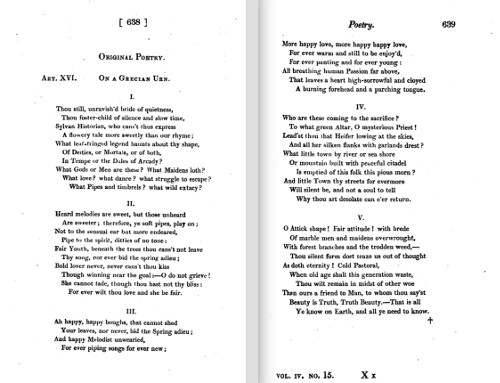
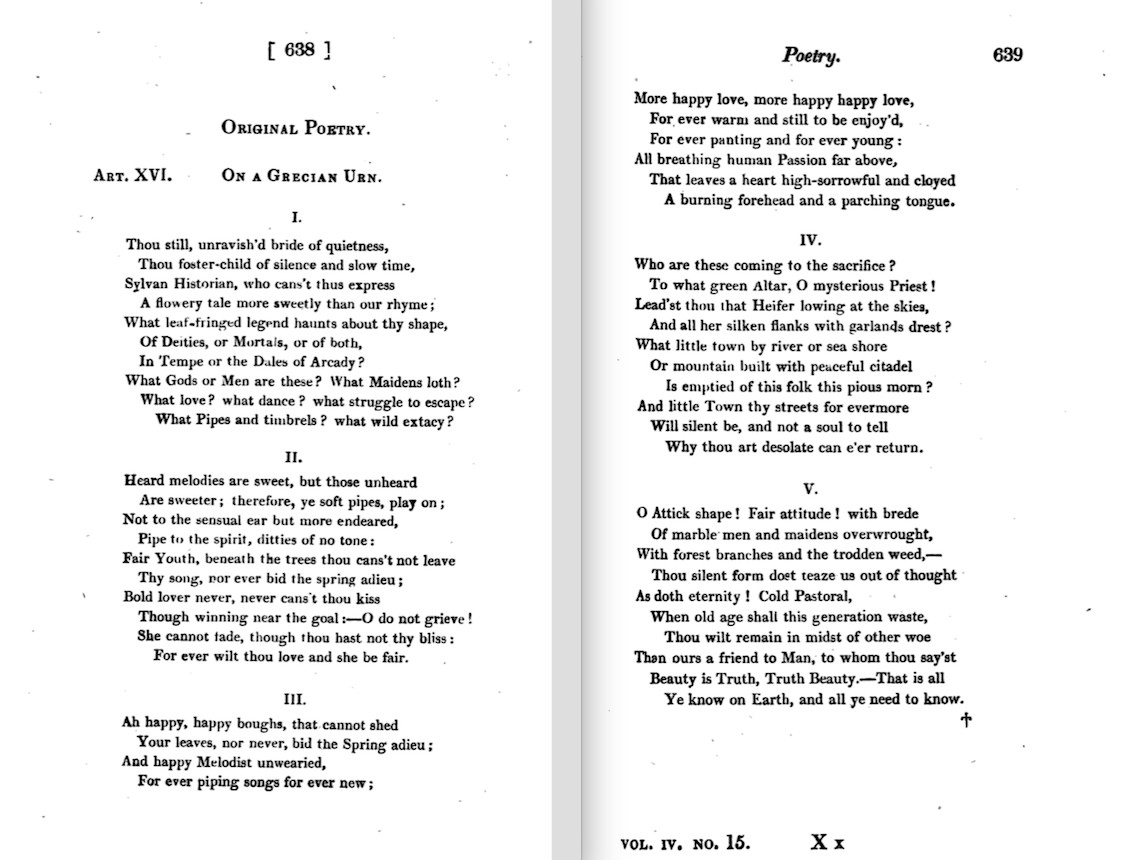
The only good news, in a way, is that one of his best poems, Ode on a Grecian Urn, is published
in Annals of The Fine Arts. The poem, probably written in
the spring of 1819, and perhaps May, reflects Keats’s mature and much-desired ability
to
capture a subject with controlled intensity, and it articulates and achieves what
Keats posits
in his poetics, that beauty is not bound by truth, fact, or reason, and thus beauty
has its
own unalterable value that will surpass knowing and outlast time. Thus art is a high
ideal
that counters and even distinguishes our mortal station. The unknowable but beautiful
urn, in
fact, is a symbol of the kind of poetry that Keats himself attempts to put before
us: we do
not know the truth
of the urn (who are these figures? where are they going? what are
they doing? who made the urn?), but we nonetheless know the urn is beautiful and possesses
imaginative potency that speaks beyond its own material and historical circumstances:
it takes
us out of ourselves and beckons our own imaginative capabilities. The urn’s qualities,
then,
mirror Keats’s poetic aspirations: to write poetry that defies mortal time and rational
knowing—poetry that will evermore remain a friend to man
(line 48) despite the burden
that our existence puts upon us. The poem pushed in this direction is an allegory
of Keats’s
writing.
These powerful conclusions have been on Keats’s mind since late 1817, when he writes
that
with a great poet the sense of Beauty overcomes over other consideration, or rather
obliterates all consideration
(letters, 21/27 Dec. 1817). Keats by 1819 has become that
great poet,
though his greatness will only begin to be (so to speak) writ large until
after his death. Characteristically, Keats’s epistolary poetics both anticipate and
propel his
poetic progress. For the first two or three years of his life as a declared poet
(approximately late 1816 to late 1818), rather than finding that mature voice, Keats
too often
ineffectually writes about desiring to be an enduring poet, or he writes poetry that,
too
self-consciously, he hopes will prove that he can simply write poetry. He’s a poet
in search
of a justification of his purpose as a poet. Those earlier years are, then, his apprentice
years—could they be anything else?—and the vast majority of the poetry lacks direction
in
subject, voice, and form. By 1819, Keats finds his stance of the great poet
mainly via
lyric forms that often pit binaries both against themselves yet simultaneously blended;
he
achieves this via a kind of poetic equipoise that often, in complex ways, revolves
around the
tensions of thought and sensation, which might be called his primary blended binary.
By late
1919, Keats seems to have neither peace of mind nor strength of body to find this
voice again.
*Otho the Great is not staged in the US until June 2016 (in Chicago, produced by Frank Farrell, and running 11-25 June); the play’s title is slightly jigged: The Dark Ages: Otho the Great. Reviews were generally quite good. The play’s world premiere is in London, 26 November 1950, put on by the Premier Theatre Club, St. Martin’s theatre; Robin Bailey plays Ludolf.

